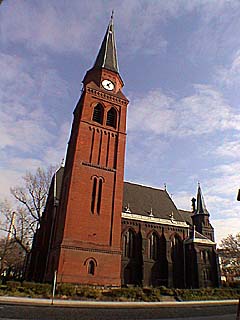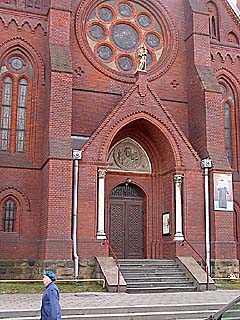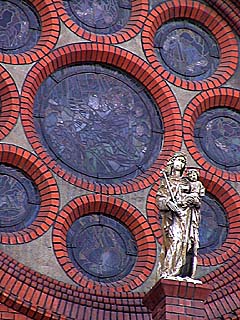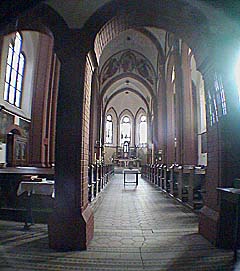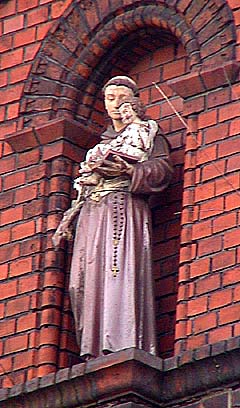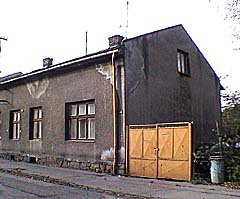
Week 6, part 9
| Ostrava is a shabby place where almost nobody speaks English. The little bits of Czech that Obbie managed to learn came in very handy. To talk with anyone over the age of about 30, it helps to know some German. Younger people are taking up English, but compared to Prague their mastery of the language is pretty rough. While RoZ was researching the quality of local toilet facilities, Obbie was studying the map of Ostrava that was on the wall outside the station, and he expressed delight at finding Sv. Pavla - the church where his grandmother was baptised. This aroused the curiosity of some passers-by, one of whom was a guy about our age named Vaclav. While frequently consulting his dictionary for the right words, Obbie told Vaclav that he was looking for Vitkovice's Catholic Cemetary (where a set of great-great-grandparents is supposed to be buried). Vaclav pointed across the road, saying, "tu! tu!" By this time RoZ had returned, and he led us down the sidewalk. We knew he was leading us someplace, and this was just another part of our adventure. Vaclav took us to the cemetary, which was literally across the road from the train station. However, the office was closed, so there was little hope of finding the graves until Monday. We'd been told we could get information on accomodation at the Hotel Atom, a four-star place about a half-mile down the road. Vaclav bought us tram tickets and took us there. Obbie asked the woman at the front desk, "mluvite anglicky?" and she said, "yes." When we found out the room rate was less than $50 including breakfast, we found no reason to leave the comfort of an English-speaking staff just to save a few bucks. We bought dinner for Vaclav and exchanged addresses; and as we parted company we delivered a warm expression of gratitude by way of the desk clerk who acted as an interpreter. The area around the hotel is a sprawling complex of grey high-rise apartment buildings ... purely functional, with no aesthetic form whatsoever. We came to call them "commie high-rises." The hotel was a commie high-rise with carpeting and a sculpture of a naked lady in the hallway (Though we can't fail to mention the friendly enough-English-speaking staff). Sunday was allocated to a day trip to the little town of Dobra in search of a marker for the other set of great-great-grandparents. We had to walk 200 m north to catch a tram that would take us to a spot close to the train station. From the tram, we saw the classic images of Vitkovice of yesterday and today: brownfields and rust belts. This was a coal and steel town, and the massive complexes of smokestack factories appear to lie derelict. This is an area suffering from some serious poverty. In spite of the poverty that plagues Ostrava, it's still able to afford a cheap and reliable tram system. It proves that a city does not have to be rich or large (Ostrava has 200,000 at the most) to support such a system. The tram let us off at the bus station. A freeway was between us and the train station, and by the time we figured out how to get there, we'd missed our train. Fortunately (we were kind of amazed, actually), the newsstand sold The Guardian, so we had some decent reading for an hour. Our train to Frydek-Mystic resembled some of the two-level German commuter trains we'd seen, except that this train was diesel-driven and looked a lot more ragged. Out the window we could see the back yards of the middle-class neighborhoods, where everyone had gardens, most people had chickens, and many people had goats.
|
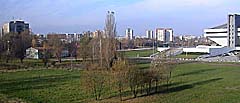 A look at the "commie high-rises" on the Vitkovice skyline, as seen from our hotel room window.
A view of Sv. Pavla Church from the side. Note how the tower is much cleaner than the rest of the church.
A wide look at the entrance to Sv. Pavla (above), and a closer look at some of the sculpture.
|
We stepped off our train in Frydek-Mystic and directly onto another train that would take us to Dobra in five minutes. After passing a landscape of rolling hills sprinkled with commie high-rises we came to a small deserted station. We didn't need a map to find the church, the town was small enough that when we looked around we could see the steeple. We got to see the church that part of the ancestral family attended, but the cemetary wasn't there. We asked the pastor where to go, but all we could understand was that it was 2 km down the road. We started walking. After asking for directions in Czech two more times along the way, we finally got there. Being Sunday, the office was closed as we expected. We found a couple of ladies who knew enough English to direct us to the older part of the cemetary, and to explain to us how European cemetaries work. Unlike the sprawling cemetaries Americans are familiar with, European places arrange their plots in tightly-packed rows. Plots the width of two queen-sized beds bear a marker for a family and a list of the family members present in this grave. A fee of some sort is paid every ten years by the family holding each plot. If the fee is not paid, the plot is given to someone else. Our language skills did not permit us to ask the obvious delicate questions on this practice. Monday we had to go to a hall of records to get an address. On Obbie's grandmother's birth certificate is the address of her birth house. But in those days, the address was a building number within the community. We needed the new address, which is a number on a street. Obbie explained (as best as he could) to the old guy at the front desk that he was trying to find the new address for an old address, so he can find the house where his grandmother was born. The front desk guy found a younger woman who spoke a bit of English - about as much as Obbie's Czech. We were told that this wasn't the right building, and that we must go to the church office. We were going to the church anyway, so off we went. Halfway down the block, the front desk guy ran up behind us and called us back. A large smiling 50-something woman had entered the picture, and she would help us get the information. We were led back through doorways and into a private office where someone had the record up on a computer screen: Vitkovice 437 is now 66 Zengrova ... a short walk from the church. They seemed to be moved by our having come so far on such a quest, and we were equally moved by these people going out of their way to help us in this quest. Sv. Pavla - the church where Obbie's great-grandparents were married and where his grandmother was baptised - was the next stop. It is a modest red-brick affair, similar to many medium-sized midwestern Catholic churches. It was built in the late 19th century, but it lies under a layer of coal soot that says volumes about Vitkovice's past. The steeple has been recently cleaned to show what the brick is supposed to look like. The signs of poverty and decay increased as we moved on toward the birth house. We passed old buildings with lots of potential, but suffering from everything from coal soot and peeling paint to floors and roofs caving in. A hundred years ago this may have been a thriving working-class neighborhood, but the same could be said for some of the most impoverished areas of North Philadelphia, which is what we were most reminded of. It is here that we found the birthplace of Obbie's grandmother, which is a simple one-story affair that appears to be occupied, and there is probably red brick under the grey stucco that covers it now. It was about a 20-minute walk to the Vitkovice Catholic Cemetery, which was on the other side of the tracks from where we were, both literally and figuratively. The office was open, but the database had no listing for the other set of great-great-grandparents. So we'd struck out on ancestral final resting places, but we had seen two churches that ancestors attended, and the last house that Obbie's ancestral family lived in before coming to America. It feels like a successful pilgrimage. Next door to the cemetery was the train station, from which a train for Prague would leave in an hour. That was just enough time to retrieve our packs from the Hotel Atom and get back to the station in plenty of time to catch the train. Sure is nice to have a tram. By early evening, we were in a hotel room close to the Prague train station, getting ready for a good night's sleep before grabbing a train for Berlin in the morning. But first we had to go to the cyber-cafe and do Internet science one more time. That was a whole new adventure, which will have to wait until next week. And then we'll tell you about Berlin, Hamburg and Christiana Copenhagen. Until then, we hope everyone is doing well. CNN shows nothing but war news, so we wouldn't mind knowing about what ELSE may be happening at home. We enjoy hearing from all of you, though we may have a hard time responding. Take care! ---- Obbie and RoZ
|
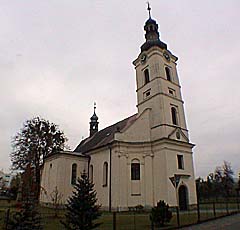 Ondrej Meca's (Andre Metza) family is likely to have attended this little Catholic church in Dobra.
The inside of Sv. Pavla in Vitkovice.
This sculpture decorates the front of the rectory of Sv. Pavla.
66 Zengrova ... the birthplace of Obbie's grandmother.
|
Week 7 ... Berlin, Hamburg, and Christiania Copenhagen.
Previous page
week 6 index
purplearth 2001 europe oddyzee index
purplearth home
